
Find Help
More Items From Ergsy search
-

How can caregivers support someone with motor neurone disease?
Relevance: 100%
-

What is motor neurone disease?
Relevance: 94%
-
Are there different types of motor neurone disease?
Relevance: 92%
-
Is motor neurone disease hereditary?
Relevance: 87%
-
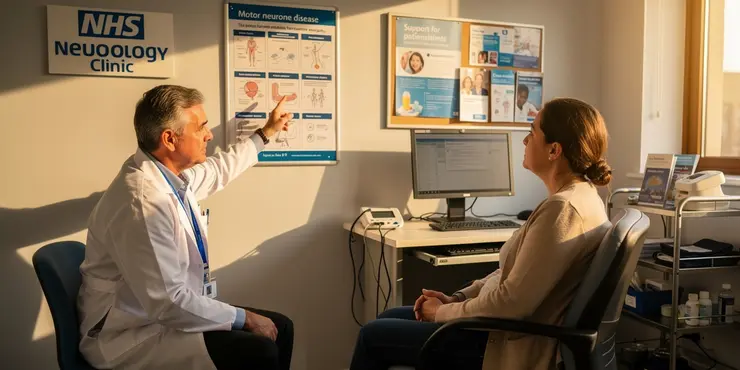
Is there a cure for motor neurone disease?
Relevance: 86%
-
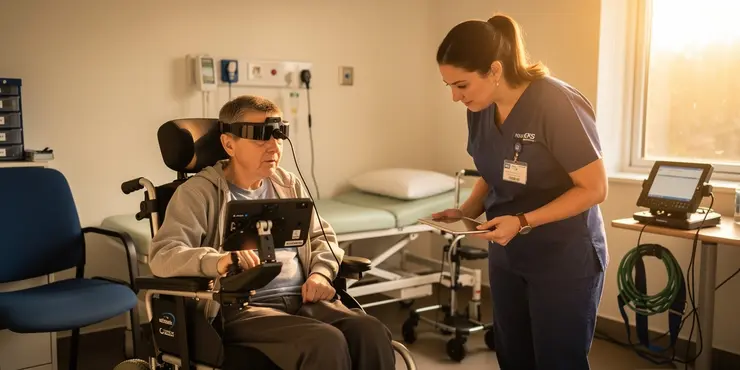
What assistive devices can help people with motor neurone disease?
Relevance: 85%
-

What causes motor neurone disease?
Relevance: 85%
-

What treatments are available for motor neurone disease?
Relevance: 81%
-
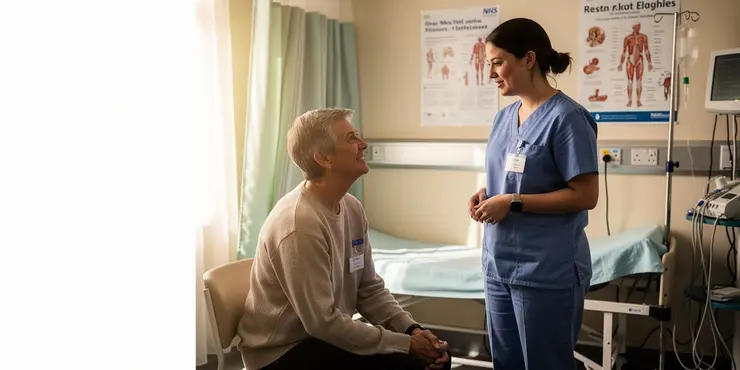
What are the primary symptoms of motor neurone disease?
Relevance: 80%
-
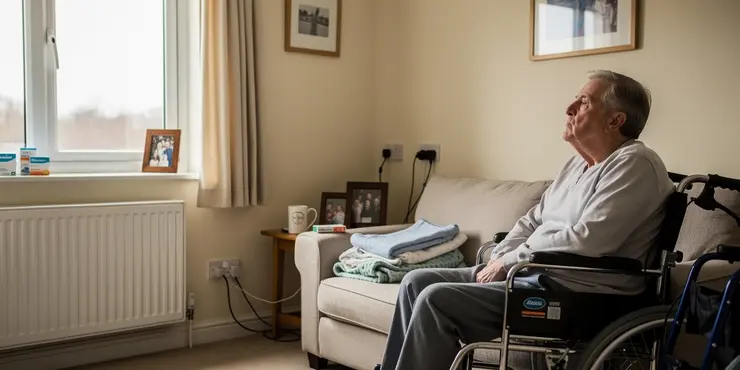
How is breathing affected by motor neurone disease?
Relevance: 78%
-

How is motor neurone disease diagnosed?
Relevance: 77%
-
How does motor neurone disease affect speech?
Relevance: 76%
-

Motor neurone disease Julie's story | NHS
Relevance: 76%
-

What role do genetics play in motor neurone disease?
Relevance: 74%
-
Can lifestyle changes impact motor neurone disease progression?
Relevance: 73%
-
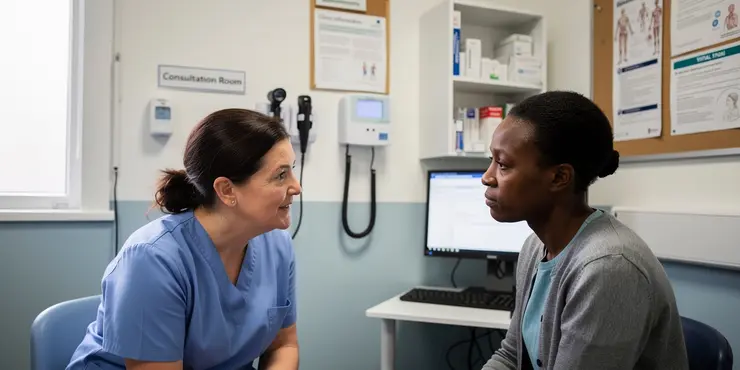
What is the life expectancy after a motor neurone disease diagnosis?
Relevance: 73%
-
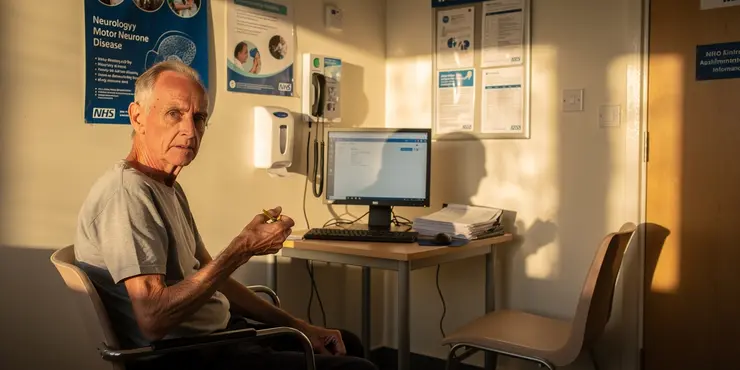
How does motor neurone disease affect the body?
Relevance: 73%
-

Are there support groups for individuals with motor neurone disease?
Relevance: 72%
-
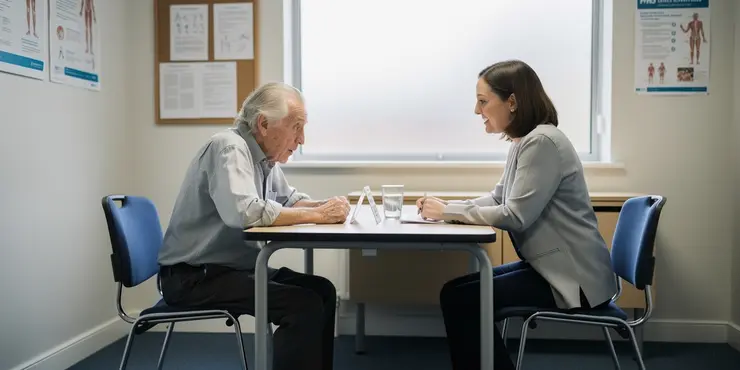
How does motor neurone disease impact swallowing?
Relevance: 70%
-

Voice banking service helps people live with motor neurone disease
Relevance: 69%
-
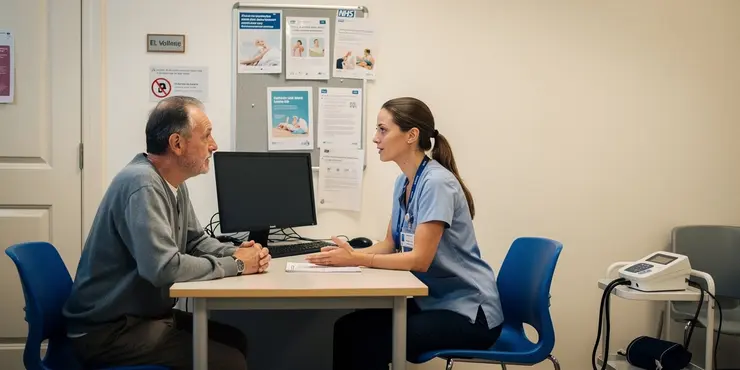
Who is at risk for motor neurone disease?
Relevance: 56%
-
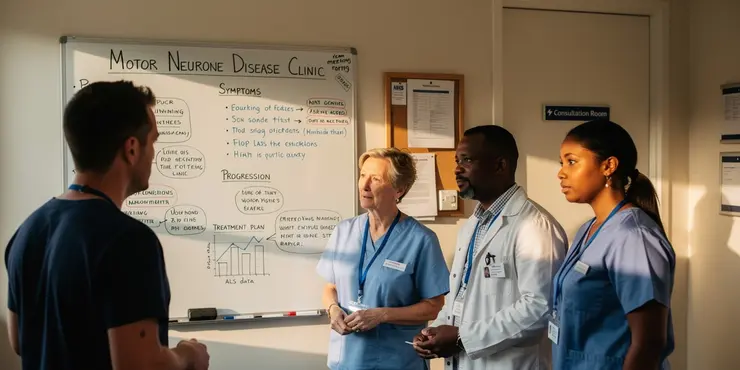
What research is being done on motor neurone disease?
Relevance: 56%
-

What is MND?
Relevance: 42%
-
How does Huntington's disease affect movement?
Relevance: 36%
-

What are senior caregiving resources?
Relevance: 36%
-

Do live-in caregivers assist with transportation?
Relevance: 36%
-

What are the qualifications of a live-in caregiver?
Relevance: 35%
-
What is Parkinson's disease?
Relevance: 34%
-

Are live-in caregivers available on weekends and holidays?
Relevance: 33%
-

What is the typical daily schedule for a live-in caregiver?
Relevance: 33%
-
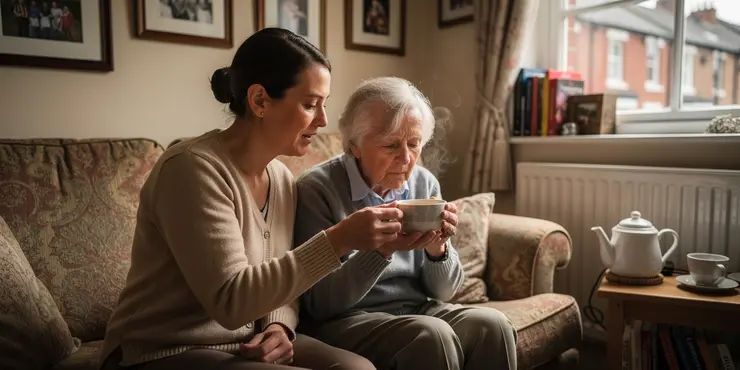
How are live-in caregivers matched with clients?
Relevance: 33%
-

How do live-in caregivers manage their personal time?
Relevance: 33%
-
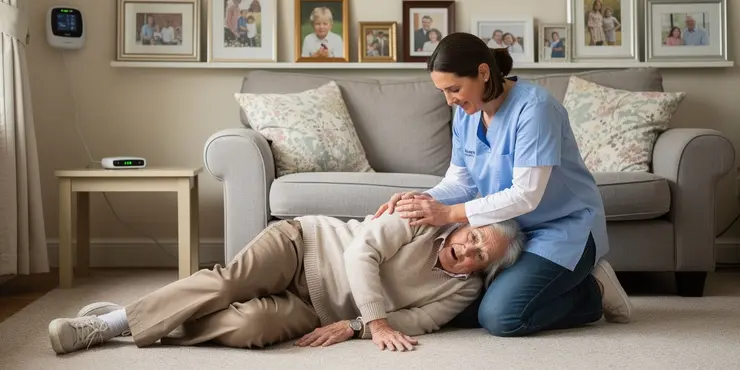
How do live-in caregivers handle emergencies?
Relevance: 32%
-

What are the stages of Alzheimer's disease?
Relevance: 31%
-
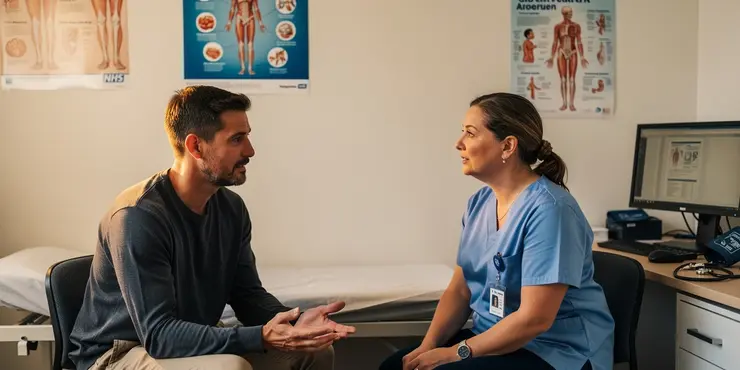
What causes Huntington's disease?
Relevance: 31%
-

Is Huntington's disease fatal?
Relevance: 31%
-
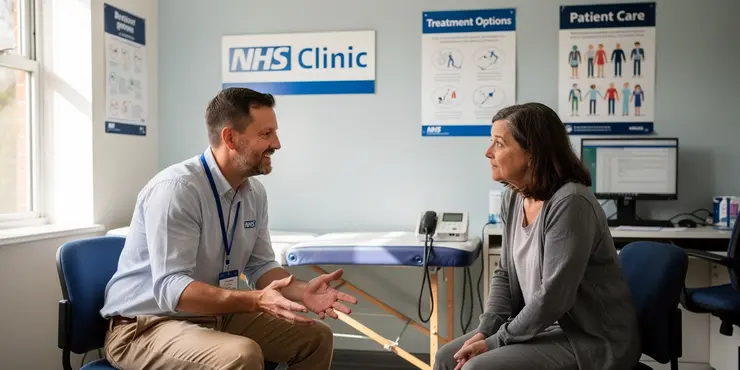
What research is being done on Huntington's disease?
Relevance: 30%
-

Parkinson’s Disease and NHS RightCare: Long Term Condition Scenario
Relevance: 29%
-

What support is available for people with Crohn's disease in the UK?
Relevance: 29%
-
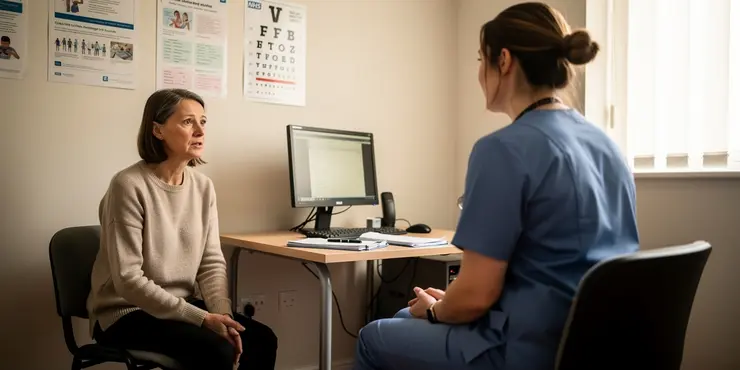
What are the symptoms of Huntington's disease?
Relevance: 29%
Understanding Motor Neurone Disease
Motor Neurone Disease (MND) is a progressive neurological condition that affects the nerves in the brain and spinal cord. In the UK, around 5,000 people are living with MND at any given time. As the disease progresses, it can lead to severe physical disability due to muscle weakness and wasting. While there is no cure, caregivers play a crucial role in supporting individuals with MND, improving their quality of life.
Effective Communication
As MND progresses, it can impact a person's ability to communicate. Caregivers can support communication by being patient, using simple language, and encouraging the use of communication aids. These aids can range from alphabet boards to advanced speech-generating devices. By ensuring clear and consistent communication, caregivers can help individuals express their needs and preferences, which is vital for maintaining their dignity and autonomy.
Assisting with Daily Activities
Individuals with MND may struggle with everyday activities due to muscle weakness. Caregivers can help by assisting with tasks such as eating, dressing, and grooming. Using adaptive equipment like special utensils or clothing with velcro fastenings can make these tasks more manageable. Encouraging the person to participate in activities to the best of their ability can also help maintain a sense of independence.
Emotional and Psychological Support
MND can be emotionally challenging, leading to feelings of frustration, anxiety, and depression. Caregivers can provide emotional support by actively listening and acknowledging these feelings. It may also be helpful to connect individuals with professional mental health support or support groups, where they can share their experiences and gain a sense of community.
Coordinating Medical Care
MND requires a multidisciplinary approach to care, often involving neurologists, physiotherapists, occupational therapists, and speech therapists. Caregivers can support by coordinating appointments, managing medications, and ensuring that all medical advice is followed. Keeping a record of symptoms and changes can also be beneficial for healthcare professionals to tailor treatment plans effectively.
Planning for the Future
As MND progresses, planning for future care needs and making decisions about end-of-life care becomes essential. Caregivers can assist by discussing these topics early and exploring options such as advanced care planning and wills. It is important to respect the individual's wishes while ensuring that they are informed of all available options.
Looking After Caregivers
Caring for someone with MND can be demanding, both physically and emotionally. It is crucial for caregivers to take care of their own health by seeking support, taking breaks, and asking for help when needed. Support can be accessed through caregiver groups or professional respite services, which offer temporary relief.
Understanding Motor Neurone Disease
Motor Neurone Disease (MND) affects the nerves in the brain and spine. In the UK, about 5,000 people have MND. It makes the muscles weak, causing trouble moving. There is no cure, but people who care for others can help to make life better.
Effective Communication
MND can make talking hard. Helpers can use simple words and be patient. They can also use tools like alphabet boards or special speaking devices. This helps people say what they need, keeping their dignity.
Assisting with Daily Activities
MND makes daily tasks like eating and dressing difficult. Caregivers can use special tools, like easy-to-hold forks or clothes with velcro. This helps people keep doing things for themselves as much as they can.
Emotional and Psychological Support
Having MND can be very tough emotionally. People may feel sad or worried. Caregivers can help by listening and understanding. It’s also good to talk to professionals or join groups to share feelings and get support.
Coordinating Medical Care
MND care needs many helpers like doctors and therapists. Caregivers can schedule doctor visits and manage medicine. They should also keep notes on how the person is doing to help doctors plan treatment.
Planning for the Future
It’s important to talk about future care for people with MND. Caregivers can help plan things like medical wishes and wills. These talks should happen early to respect the person’s choices.
Looking After Caregivers
Helping someone with MND can be hard work. Caregivers need to care for themselves, too. They should take breaks and ask for help. Joining support groups or using respite services can give them a break and support.
Frequently Asked Questions
What is motor neurone disease (MND)?
Motor neurone disease is a progressive neurological condition that affects the motor neurons, leading to muscle weakness and atrophy.
How can I help with communication for someone with MND?
Encourage the use of communication aids like speech-generating devices, apps, and maintaining eye contact. Be patient during conversations.
What is the role of physiotherapy in supporting someone with MND?
Physiotherapy can help maintain mobility and reduce stiffness. A physiotherapist can design exercises to suit the individual’s needs.
How can I support the nutritional needs of someone with MND?
Work with a dietitian to ensure adequate nutrition. Prepare easy-to-swallow meals, and consider supplements if recommended by healthcare professionals.
How do I assist with mobility for someone with MND?
Encourage the use of mobility aids like wheelchairs or walkers. Ensure the home environment is safe and accessible.
How can I manage fatigue in someone with MND?
Help plan activities to balance rest and exertion. Encourage short naps and a consistent sleep routine.
What emotional support can I provide to someone with MND?
Be available to listen and provide companionship. Encourage them to express their feelings and seek professional counseling if needed.
How can I stay informed about MND?
Attend workshops, join support groups, and access reliable resources from MND associations to keep updated.
How do I handle the legal and financial planning for someone with MND?
Assist with setting up legal documents, such as a power of attorney. Consult a financial planner familiar with long-term care costs.
What can I do to help prevent pressure sores in someone with MND?
Regularly change their position, use pressure-relieving cushions, and monitor skin condition to prevent pressure sores.
How should I approach personal care and hygiene needs?
Respect their privacy and dignity. Assist with activities like bathing and dressing, and adapt techniques as needed.
What adaptive equipment is beneficial for someone with MND?
Consider equipment such as adjustable beds, shower seats, and assistive utensils to facilitate daily activities.
How can I help improve the respiratory function of someone with MND?
Work with healthcare providers on lung exercises, use supportive equipment like ventilators, and monitor breathing difficulties.
What should I know about medication management for someone with MND?
Organize medications in a systematic way and set up reminders. Communicate with healthcare providers about any side effects.
How can I provide meaningful engagement and activities?
Encourage interests and hobbies that align with their capabilities. Adapt activities to ensure participation.
How do I handle dietary changes and swallowing difficulties?
Consult with a speech-language pathologist for dietary adjustments and assist with safe swallowing techniques.
What should I consider for emergency preparedness with MND?
Create a plan that includes emergency contacts, accessible medical information, and knowledge of the individual's specific needs.
How important is social interaction for someone with MND?
Social interaction is vital for mental health. Encourage visits from friends and family and participation in social activities as possible.
What resources are available for MND caregivers?
Access resources such as caregiver support groups, online forums, educational workshops, and respite care services.
How can I manage my stress and well-being as a caregiver?
Prioritize self-care, seek support from other caregivers, and consider counseling or therapy to manage stress.
What is Motor Neurone Disease (MND)?
Motor Neurone Disease, or MND, is a sickness. It makes it hard for the brain to talk to the muscles. This makes the muscles weak.
When you have MND, it can be hard to move, speak, swallow, and even breathe.
MND does not get better, but there are ways to help. Doctors, nurses, and special tools can support people with MND.
If you have questions, talking to a doctor or nurse can help. They can give you information and support.
Motor neurone disease is a disease that gets worse over time. It affects the nerves that control your muscles. This makes your muscles weak and they get smaller.
How can I help someone with MND talk and share ideas?
MND is a short way of saying Motor Neurone Disease. People with MND can find it hard to talk.
Here are some ways to help:
- Be patient: Give them extra time to speak. Listen carefully.
- Use pictures and gestures: Draw simple pictures or use hand signals to help explain words.
- Write it down: Use a notepad to write short messages.
- Use technology: There are special apps and devices that can help them talk.
- Ask yes or no questions: This makes it easier for them to answer.
Always be kind and understanding. Help them feel comfortable when talking.
It's good to use tools that help with talking, like special machines that say words out loud, or apps on phones and tablets. Try to look at the person's face when you talk to them. Be patient when you're having a conversation.
How can physiotherapy help someone with MND?
Physiotherapy helps keep muscles strong and flexible.
It makes moving easier and less painful.
Exercises from a physiotherapist can support breathing and daily activities.
Tools like wheelchairs or braces might be suggested for support.
Ask a physiotherapist any questions you have. They are there to help!
Physiotherapy helps you move better and feel less stiff. A physiotherapist is a special helper who can make exercises just for you.
How can I help someone with MND eat well?
MND is short for Motor Neurone Disease. It is important for people with MND to eat healthy food.
Here are ways you can help:
- Offer soft foods: Foods like yogurt, smoothies, and mashed potatoes are easier to eat.
- Give small meals often: Eating small amounts many times can help.
- Use a straw: A straw can make drinking liquids easier.
- Ask a doctor: They can give advice on what to eat.
- Use special tools: Things like special forks and spoons can help with eating.
If you're not sure what to do, always ask a doctor or a nutrition expert for help.
Ask a dietitian to help you eat healthy food. Make soft food that is easy to swallow. If a doctor says it's okay, you can also take vitamins or extra nutrients.
How can I help someone with MND move around?
Helping someone with MND move is important. MND makes it hard for them to move. Here are some simple ways you can help:
- Use a wheelchair or walking aid. These tools can help them move safely.
- Ask a doctor or therapist for advice. They can give you tips on how to help.
- Try using a lift or ramp to make moving easier.
- Check the home for safe paths. Remove things that might be in the way.
Be kind and patient. Moving can be hard for them.
Help people use things like wheelchairs or walkers to move around. Make sure the home is safe and easy to get around.
How can I help someone with MND who is very tired?
People with MND (Motor Neurone Disease) can get very tired. Here are some ways to help:
- Rest: Make sure they take breaks and rest often.
- Plan: Help them plan their day. Do the most important things when they have more energy.
- Support: Ask others to help with tasks to save their energy.
- Tools: Use things like a wheelchair or walking aids to make moving easier.
- Talk: Encourage them to talk to a doctor or nurse about the tiredness.
- Emotions: Support their feelings and emotions, as being tired can be hard.
Help plan fun things to do. Make sure there is time to rest and time to play. Encourage short naps and going to bed at the same time every night.
How can I help someone with MND feel better?
MND is a sickness that makes muscles weak. It's hard for people with MND to do things.
Here are ways you can help:
- Listen when they want to talk. It shows you care.
- Spend time with them so they don't feel alone.
- Help them with things they find hard to do.
- Be patient and kind. They may take longer to do things or speak.
- Ask them what they need. Everyone is different.
To learn more or if you need help, you can:
- Talk to a doctor or nurse.
- Join a support group where people share their stories.
- Read simple guides or use apps that explain MND clearly.
Be there to listen and spend time with them. Help them talk about their feelings. If they need more help, suggest they talk to a counselor.
How can I learn more about MND?
MND means Motor Neurone Disease. It is important to know about it.
Here are some easy ways to learn:
- Read simple books or stories about MND with big pictures.
- Watch short videos that talk about MND.
- Ask someone you trust to explain it to you.
Helpful tools:
- Use apps that read text out loud.
- Listen to audio guides or podcasts about MND.
It's good to learn a little bit every day!
Go to classes, meet with support groups, and use safe information from MND (Motor Neurone Disease) groups to stay in the know.
How can I help someone with MND with money and legal plans?
Help set up important legal papers, like a power of attorney. Talk to a money expert who knows about long-term care costs.
How can I stop pressure sores for someone with MND?
MND stands for Motor Neurone Disease. It is important to stop pressure sores. Pressure sores can happen if a person stays in one position for too long. Here are some simple ways to help:
- Help the person change positions often to stop pressure on one spot.
- Use soft pillows or cushions to give extra support.
- Make sure the person's skin is clean and dry. Check for red or sore spots.
- Use special cream to keep the skin healthy.
- Try using a special mattress that helps take the pressure off the skin.
Ask a nurse or doctor for more help and advice. You can also find more information using picture guides or videos. These can be very helpful.
Move around a lot. Use special cushions to be comfy. Check your skin to stop sores (ouchy spots) from happening.
How do I take care of myself and stay clean?
Here are some simple steps:
- Wash your hands: Use soap and water to wash your hands well. Do this before eating and after using the toilet.
- Brush your teeth: Brush your teeth for two minutes, two times a day. You can use an egg timer to help you with the time.
- Bathe regularly: Take a bath or shower to keep your body clean. Doing this once a day can help.
- Wear clean clothes: Change into clean clothes every day.
- Use a comb or brush: Keep your hair neat by brushing or combing it every day.
If you find it hard, you can:
- Ask someone you trust for help.
- Use pictures or charts to remind you what to do.
- Set reminders on your phone or use an alarm clock.
Taking care of yourself helps you stay healthy and happy!
Respect their privacy and make sure they feel special. Help them with things like taking a bath and getting dressed. Change how you help if they need it done differently.
What helpful tools can someone with MND use?
Think about using special tools to help make everyday tasks easier, like beds that can move up and down, seats to use in the shower, and special forks and spoons.
How can I help someone with MND breathe better?
Work with healthcare workers to practice breathing exercises. Use helpful machines like ventilators and keep an eye on any problems with breathing.
What do I need to know about medicine for someone with MND?
MND means motor neurone disease. It's a sickness that can make muscles weak. People with MND may need special medicine.
- Ask the doctor: Doctors know best which medicines can help.
- Make a list: Write down all the medicines they need to take. This helps to remember.
- Follow instructions: It is important to take medicine the way the doctor says.
- Use a pill box: This can help keep track of when to take each pill.
- Set reminders: Use alarms to remember when to take the medicine.
It is okay to ask for help if you’re not sure of anything. Talking to the doctor or a nurse can be useful.
Put your medicines in order and use reminders to help you remember. Talk to your doctor about any problems you have with your medicine.
How can I help with fun and helpful activities?
Support the person's interests and hobbies. Find things they like that they can do. Change activities if needed so everyone can join in.
How do I manage changes in eating and swallowing?
Some people need to eat different foods because of health problems. This can include soft foods that are easy to chew and swallow.
If you have trouble swallowing, try these tips:
- Cut food into small pieces. It is easier to eat.
- Eat slowly. Take small bites.
- Drink water or a drink. It can help you swallow.
If needed, ask a doctor or a helper for advice. They can give you more tips.
Talk to a speech helper to learn about changing what you eat. They can also help you swallow safely.
What do I need to think about for emergencies if I have MND?
If you have MND, it's important to be ready for emergencies. Here are some simple steps to help:
- Keep a list of emergency phone numbers. These are the numbers you call for help.
- Have a plan for what to do if something goes wrong. Talk to your family about this plan.
- Make sure you have all the important things you need, like medicine and important papers.
- Ask someone you trust to be your "emergency buddy." They will help you if you need it.
You can use tools like a mobile phone to help you stay safe. There are special apps that can call for help if you need it.
Make a plan. Include phone numbers for people you can call for help. Write down important medical info. Learn what the person needs if something happens.
Why is spending time with friends important for someone with MND?
It is very important for people with MND to spend time with friends and family. Being with people can make them feel happier and less lonely.
Here are some ways to help:
- Use video calls to see and hear each other.
- Write letters or send text messages.
- Play simple games together, like online puzzles.
Talking to people is important for feeling happy. Invite friends and family to visit. Try to join fun activities with others when you can.
What help is there for people caring for someone with MND?
Looking after someone with MND can be hard. There is help you can get:
- Support groups: You can talk to others who know about MND.
- Books and guides: There are easy-to-read books on how to help.
- Online forums: You can ask questions and share your story.
- Community centers: Some places have special meet-ups.
These tools can help you:
- Reminder apps: Use apps to help remember medicines and appointments.
- Relaxing techniques: Deep breathing or listening to calm music can help you feel better.
- Ask for help: Family or friends can help you with chores.
Get help from caregiver support groups, online chat rooms, learning workshops, and places where someone else can look after your loved one for a short time.
How can I feel better and less stressed when I help take care of someone?
If you help take care of someone else, it is important to also take care of yourself. Here are some simple things you can do:
- Take Breaks: Make sure you rest. It helps your body and mind feel better.
- Ask for Help: You don't have to do everything by yourself. Ask friends or family to help you.
- Do Things You Enjoy: Spend time doing things you like, such as reading, drawing, or listening to music.
- Talk About How You Feel: Share your feelings with someone you trust. It can help to talk and not keep feelings inside.
- Eat and Sleep Well: Try to eat healthy food and get enough sleep. This helps you stay strong and healthy.
It can also help to use special tools:
- Meditation Apps: Use smartphone apps that teach you how to relax and breathe.
- Support Groups: Join groups where you can meet and talk to other people who also take care of someone.
Remember, taking care of yourself is important too.
Take care of yourself first. Talk to other people who help care for others, and think about talking to a counselor or therapist to help you feel less stressed.
Useful Links
This website offers general information and is not a substitute for professional advice.
Always seek guidance from qualified professionals.
If you have any medical concerns or need urgent help, contact a healthcare professional or emergency services immediately.
Some of this content was generated with AI assistance. We’ve done our best to keep it accurate, helpful, and human-friendly.
- Ergsy carfully checks the information in the videos we provide here.
- Videos shown by Youtube after a video has completed, have NOT been reviewed by ERGSY.
- To view, click the arrow in centre of video.
- Most of the videos you find here will have subtitles and/or closed captions available.
- You may need to turn these on, and choose your preferred language.
- Go to the video you'd like to watch.
- If closed captions (CC) are available, settings will be visible on the bottom right of the video player.
- To turn on Captions, click settings .
- To turn off Captions, click settings again.
More Items From Ergsy search
-

How can caregivers support someone with motor neurone disease?
Relevance: 100%
-

What is motor neurone disease?
Relevance: 94%
-
Are there different types of motor neurone disease?
Relevance: 92%
-
Is motor neurone disease hereditary?
Relevance: 87%
-

Is there a cure for motor neurone disease?
Relevance: 86%
-

What assistive devices can help people with motor neurone disease?
Relevance: 85%
-

What causes motor neurone disease?
Relevance: 85%
-

What treatments are available for motor neurone disease?
Relevance: 81%
-

What are the primary symptoms of motor neurone disease?
Relevance: 80%
-

How is breathing affected by motor neurone disease?
Relevance: 78%
-

How is motor neurone disease diagnosed?
Relevance: 77%
-
How does motor neurone disease affect speech?
Relevance: 76%
-

Motor neurone disease Julie's story | NHS
Relevance: 76%
-

What role do genetics play in motor neurone disease?
Relevance: 74%
-
Can lifestyle changes impact motor neurone disease progression?
Relevance: 73%
-

What is the life expectancy after a motor neurone disease diagnosis?
Relevance: 73%
-

How does motor neurone disease affect the body?
Relevance: 73%
-

Are there support groups for individuals with motor neurone disease?
Relevance: 72%
-

How does motor neurone disease impact swallowing?
Relevance: 70%
-

Voice banking service helps people live with motor neurone disease
Relevance: 69%
-

Who is at risk for motor neurone disease?
Relevance: 56%
-

What research is being done on motor neurone disease?
Relevance: 56%
-

What is MND?
Relevance: 42%
-
How does Huntington's disease affect movement?
Relevance: 36%
-

What are senior caregiving resources?
Relevance: 36%
-

Do live-in caregivers assist with transportation?
Relevance: 36%
-

What are the qualifications of a live-in caregiver?
Relevance: 35%
-
What is Parkinson's disease?
Relevance: 34%
-

Are live-in caregivers available on weekends and holidays?
Relevance: 33%
-

What is the typical daily schedule for a live-in caregiver?
Relevance: 33%
-

How are live-in caregivers matched with clients?
Relevance: 33%
-

How do live-in caregivers manage their personal time?
Relevance: 33%
-

How do live-in caregivers handle emergencies?
Relevance: 32%
-

What are the stages of Alzheimer's disease?
Relevance: 31%
-

What causes Huntington's disease?
Relevance: 31%
-

Is Huntington's disease fatal?
Relevance: 31%
-

What research is being done on Huntington's disease?
Relevance: 30%
-

Parkinson’s Disease and NHS RightCare: Long Term Condition Scenario
Relevance: 29%
-

What support is available for people with Crohn's disease in the UK?
Relevance: 29%
-

What are the symptoms of Huntington's disease?
Relevance: 29%


